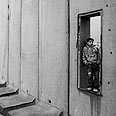
How to avoid apartheid
Op-ed: Instead of saying Israel isn't apartheid state, let's aim to ensure we don't become one
The eulogies that came out from Israel tended to forget the ongoing cooperation between Israel and the apartheid regime in South Africa, but that may already be a matter for historians and history books – as Mandela himself said during a visit to Israel in 1999 that he did not bear a grudge. But this word, "apartheid," does not only belong in the past. It is raised again sometimes today, this time in regards to what is taking place in Israel.
I'm not in the habit of using the term "apartheid" in regards to what is going on here, although there are similarities between legal systems which create race-based discrimination between citizens and residents. The main reason I don't use the word is that many of those who started reading this article are no longer with us in this paragraph. They stopped reading the moment they saw the words "Israel" and "apartheid" in the same context, and thus we lost an opportunity for a real discourse with the Israeli public.
In the Israeli discourse, in every discussion on discrimination, the word "apartheid" tends to change the direction of the conversation. Suddenly, instead of talking about what is really happening here – the legal gaps, the serious discrimination in budgets against Arabs, or race-based humiliating security checks – the discussion shifts to the question of how accurate the term is in regards to Israel. Suddenly, even many of those who admit there is a problem of serious discrimination in Israel rush to its defense. Some use the winning argument that "saying there is apartheid in Israel is anti-Semitic." And so, instead of discussing the essence, the discussion becomes rhetoric, semantic, and mostly unnecessary.
So I'll gladly put this word aside, if that's what will help us start taking serious action in regards to the other words which undoubtedly describe the current situation: Words like occupation, discrimination, despoliation, torture and humiliation.
We tend to look at events in history and fantasize about what we would have done had we been there at the time. Had I lived in South Africa during the apartheid regime, I would like to think that I would have acted against it. We also live in a time and place in which serious injustices are taking place.
The question is whether we can put aside the narratives and contexts, and abandon the efforts focusing on explaining to ourselves and others that what is happening here is not exactly apartheid? Instead, perhaps we should invest our energy in an action aimed at guaranteeing that reality in Israel will be the most different thing possible from apartheid?
"For to be free is not merely to cast off one's chains, but to live in a way that respects and enhances the freedom of others." (Nelson Mandela)
Yonatan Gher is the CEO of Amnesty International Israel










